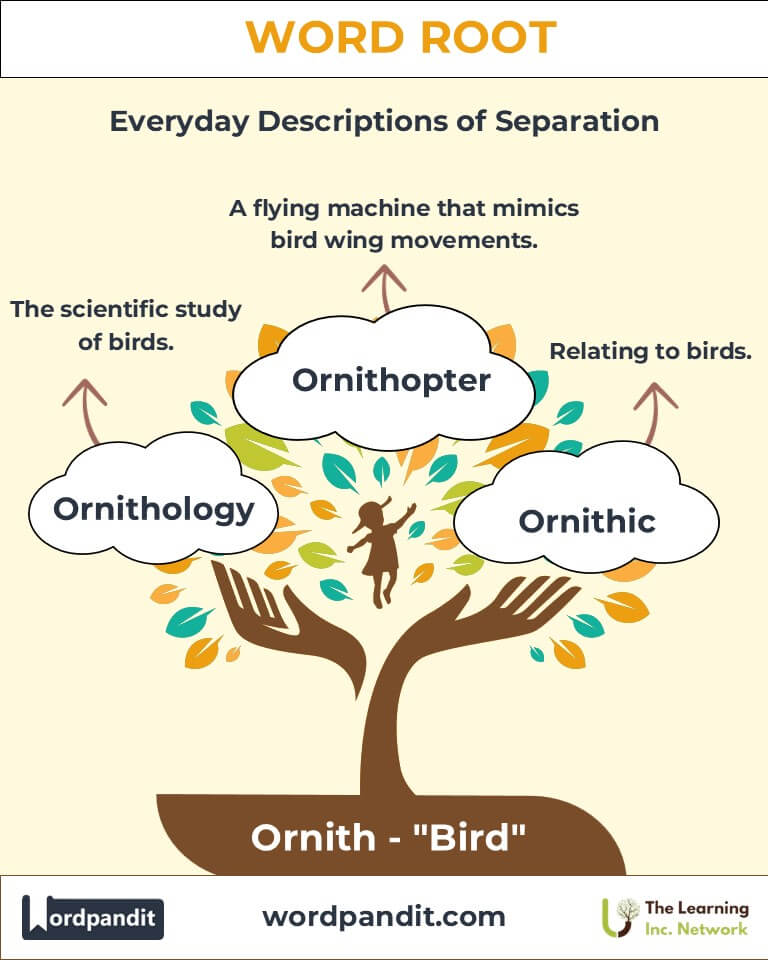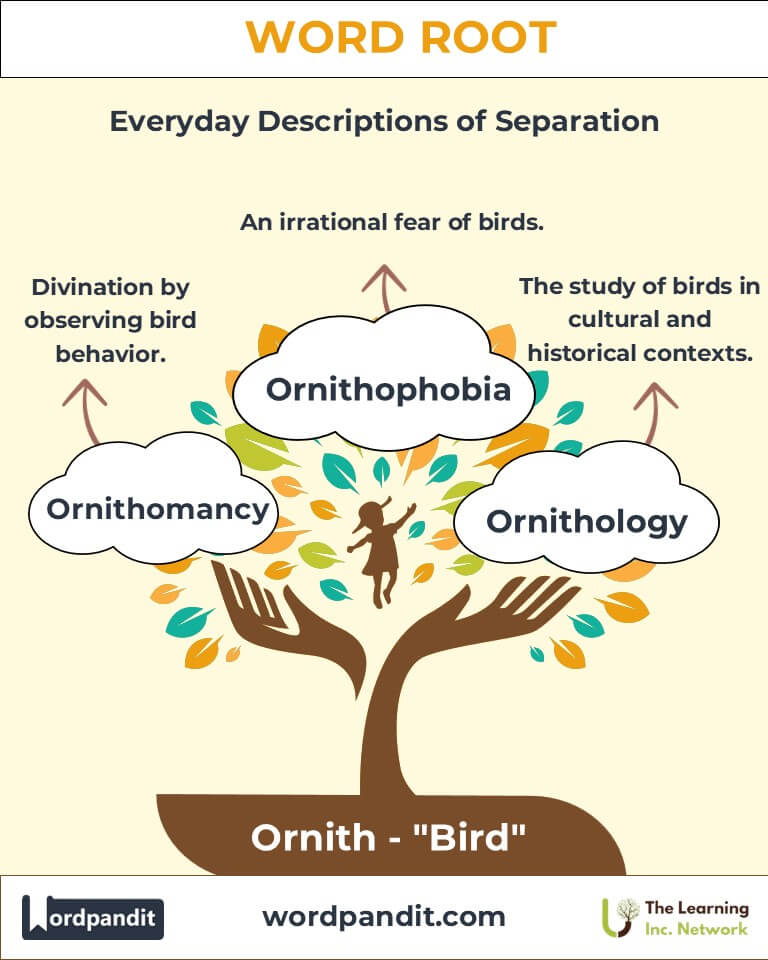Ornith: Exploring the World of Birds in Language and Science
Discover the avian wonders encapsulated by the root "ornith," from its origins in the Greek language to its flight into fields like biology and aeronautics.

Table of Contents
- Introduction: The Essence of "Ornith"
- Etymology and Historical Journey
- Mnemonic: Unlocking the Power of Ornith
- Common Ornith-Related Terms
- "Ornith" Through Time
- "Ornith" in Specialized Fields
- Illustrative Story: "Ornith" in Action
- Cultural Significance of the "Ornith" Root
- The "Ornith" Family Tree
- FAQs About the “Ornith” Word Root
- Test Your Knowledge: “Ornith” Word Root Quiz
- Conclusion: The Living Legacy of "Ornith"
Introduction: The Essence of "Ornith"
The root "ornith" (pronounced OR-nith) originates from the Greek word ornis, meaning "bird." This avian-inspired root spreads its wings across numerous fields, symbolizing the human fascination with birds—from their beauty and mystery to their roles in nature and science. Words like ornithology (the study of birds) and ornithopter (a bird-like flying machine) demonstrate its relevance in biology and innovation.

Etymology and Historical Journey
The journey of "ornith" begins in ancient Greece with ornis (genitive: ornithos), meaning "bird." Early naturalists used this root to classify and describe avian species. Over time, the term migrated into Latin, becoming ornithologia—the foundation for modern ornithology. As scientific disciplines expanded, "ornith" gained prominence, embodying humanity's quest to understand and emulate the wonders of flight.
Mnemonic: Unlocking the Power of Ornith
Imagine a majestic bird soaring gracefully through the sky, its shadow spelling out the letters "ORNITH."
Mnemonic Device:
"Ornith takes flight with every bird in sight."
Common Ornith-Related Terms
- Ornithology (or-ni-THOL-uh-jee):
Definition: The scientific study of birds.
Example: "Her passion for ornithology led her to study migratory patterns of sparrows." - Ornithopter (or-ni-THOP-ter):
Definition: A machine designed to fly by mimicking bird wing movements.
Example: "The inventor showcased an ornithopter capable of powered flight." - Ornithophobia (or-ni-tho-FOH-bee-uh):
Definition: An irrational fear of birds.
Example: "His ornithophobia made visits to the park a challenge." - Ornithomancy (or-ni-THO-man-see):
Definition: Divination by observing bird behavior.
Example: "In ancient Greece, ornithomancy was used to predict the outcome of battles." - Ornithic (or-NITH-ik):
Definition: Relating to birds.
Example: "The museum displayed ornithic fossils dating back millions of years."
"Ornith" Through Time
- Ancient Greece: Ornithomancy was a respected form of divination, interpreting the movements of birds as signs from the gods.
- Renaissance: Ornithology emerged as a formal science, fueled by explorers documenting exotic bird species.
- Modern Era: The root expanded into technology with innovations like ornithopters, blending biology with engineering.
"Ornith" in Specialized Fields
- Biology:
Ornithology: Studies bird behavior, anatomy, and ecosystems.
Example: Research into penguin colonies enhances understanding of climate change impacts. - Aeronautics:
Ornithopters: Inspire engineers to mimic avian flight for efficient aerial technology.
Example: Prototype drones use ornithopter designs for silent surveillance. - Cultural Studies:
Ornithomancy: Reveals ancient cultural practices and beliefs tied to birds.
Illustrative Story: "Ornith" in Action
Dr. Lila, an ornithologist, embarked on an expedition to track endangered eagles. Her journey required an ornithopter, custom-designed for silent navigation through dense forests. While observing the majestic birds in their natural habitat, she recorded their calls, contributing to a conservation program. Her passion for ornithology demonstrated the profound impact of studying and preserving avian species.
Cultural Significance of the "Ornith" Root
Birds have long been symbols of freedom, wisdom, and omens in various cultures. From the phoenix of mythology to the doves of peace, ornithic imagery pervades literature, art, and religion. Even today, birdwatching remains a popular hobby, connecting people with nature and fostering environmental awareness.

The "Ornith" Family Tree
- Avi- (Latin: bird):
- Aviary: A large enclosure for birds.
- Aviation: The practice of flying aircraft.
- Pter- (Greek: wing):
- Pterodactyl: A winged prehistoric reptile.
- Helicopter: A rotor-winged aircraft.
- Zoo- (Greek: animal):
- Zoology: The scientific study of animals.
- Zooid: An individual animal that is part of a colony.

FAQs About the Ornith Word Root
Q: What does the root "ornith" mean?
A: The root "ornith" means "bird." It is derived from the Greek word ornis and is used in various terms to describe avian-related concepts, such as ornithology (study of birds) or ornithophobia (fear of birds).
Q: What is ornithology?
A: Ornithology is the scientific study of birds. It encompasses their behavior, physiology, migration patterns, and role in ecosystems. Ornithologists often contribute to conservation efforts by studying how environmental changes affect bird populations.
Q: What is an ornithopter?
A: An ornithopter is a machine designed to mimic the wing-flapping motion of birds for flight. It combines biology and engineering principles to replicate avian flight, inspiring innovation in aeronautics.
Q: How does ornithology help conservation?
A: Ornithology provides critical data on bird species, habitats, and migration patterns. By studying these factors, scientists can identify endangered species, understand ecological imbalances, and recommend protective measures to preserve biodiversity.
Q: What is ornithophobia, and how is it treated?
A: Ornithophobia is an irrational fear of birds. It may stem from a traumatic experience or cultural beliefs. Treatment includes therapy, such as cognitive-behavioral therapy (CBT), which helps individuals gradually overcome their fear.
Q: What is ornithomancy, and where was it practiced?
A: Ornithomancy is the practice of divination by observing birds’ flight patterns or behavior. Ancient Greeks and Romans used ornithomancy to interpret omens and make decisions, believing birds were messengers of the gods.
Q: Can non-scientists participate in ornithology?
A: Yes, birdwatchers and citizen scientists significantly contribute to ornithology by reporting bird sightings, migration patterns, and nesting behaviors. Their observations help build databases like those maintained by organizations such as the Audubon Society.
Test Your Knowledge: Ornith Word Root Quiz
1. What does the root "ornith" mean?
2. Which field studies birds scientifically?
3. What is an ornithopter?
4. What does ornithophobia describe?
5. What does ornithomancy refer to?
Conclusion: The Living Legacy of "Ornith"
The root "ornith" reflects humanity's enduring fascination with birds. From ancient divinations to modern ornithology and technology, this root connects us to the natural world and its mysteries. As we continue to study and emulate avian marvels, "ornith" remains a symbol of discovery, innovation, and appreciation for our feathered companions.












